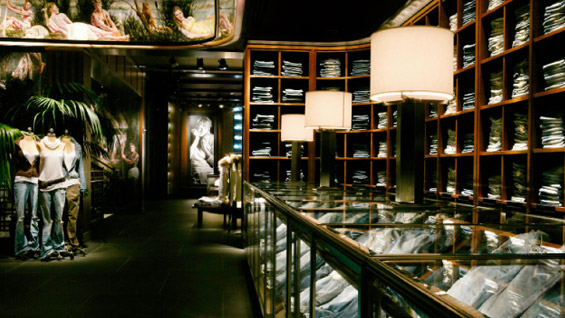Abercrombie has defended itself by arguing that its
employees must follow its “look policy”, a strict dress code that perpetuates
the company’s brand and image. It is considered an important component of their
marketing strategy, and they justify its enforcement because it is constituted as
“commercial free speech”.
The question at heart here is two-parted. For one, does “commercial
free speech” trump individual free speech, and secondly do the religious
overtones of the case indicate that a violation of the free exercise clause has
occurred? To address the former concern first, Abercrombie’s look policy dictates
that no headgear may be worn by any employee. That is a generally applicable
policy that appears neutral. However, as pointed out by the dissent in Oregon v. Smith, a generally applicable
law does not protect the minority and does not automatically make it immune to
amounting to religious discrimination. Banning headgear in general is
acceptable commercial free speech, but not accommodating an individual because of
their religion appears as a blatant violation of free exercise. Wearing the
hijab is a fundamental religious practice to the plaintiffs, and thus this case
more closely deals with free exercise and accommodation.
The ninth circuit court utilizes two tests in order to
determine religious accommodation cases:
A plaintiff must first establish a prima facie case. If
successful, the burden then shifts to the employer to show that it “initiated
good faith efforts to accommodate reasonably the employee’s religious practices
or that it could not reasonably accommodate the employee without undue
hardship.” (Peterson v. Hewlett-Packard
Co., 358 F.3d 599, 606 (9th Cir. 2004).
The plaintiff accomplished the first facet by establishing
that they would incur significant burden by complying with Abercrombie’s dress
policies. Accommodation was not made as the employer fired the plaintiff for
non-compliance. Abercrombie could only claim undue hardship, but ultimately
that was found to be unsubstantiated. The court did not find the “look policy”
to be so crucial to the company’s marketing success as they were unable to
provide any evidence that the wearing of the hijab bore any detriment to the
store’s sales. Abercrombie also argued that its employees are “living
advertisements” and thus they have a right to force conformity amongst their employees’
dress. The court argued that since the plaintiffs in this case amounted to
stockroom workers, they were not in the public eye and thus could not be
classified as “living advertisements”. Subsequently, judgment was in favor of
the plaintiffs.
Is this the correct decision? The argument that supports
Abercrombie is that businesses are allowed to discriminate based on characteristics
that would be considered “bona fide occupational qualifications”. This loophole
in the employment discrimination law dictates that otherwise discriminatory
practices can be overlooked if they would prove undermining to a particular
business model. Companies such as Hooters or Catholic colleges utilize this
practice when hiring female waitresses or Catholic faculty members,
respectively. The latter example shows that religion can be used to legally
filter employees. I ultimately agree with the Court in that both the “undue
hardship” and “living advertisement” arguments seem weak. In Wilson v. Southwest Airlines, bona fide
occupational qualifications were analyzed and it was determined that customer
satisfaction alone cannot be a determination in cases utilizing the law as a
defense. In essence, this is the core precept of Abercrombie’s argument and
thus is invalid through precedent. The plaintiff, or rather anyone, should have
an equal opportunity to work wherever they want, and by refusing to accommodate
a hijab Abercrombie is practicing religious discrimination under the free
exercise clause. Looking at the broader implications of these cases, do you
think a private business has a right to tailor their policies to this extent,
even if it excludes certain religious groups? Keep in mind that they only
believe they are doing what is best for their economic success and survival
(although I personally disagree with that belief).
Here is the full complaint.














